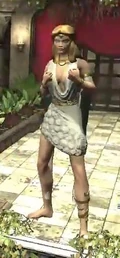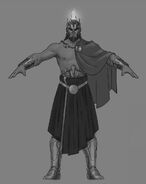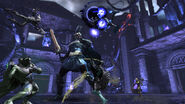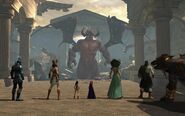The Olympians, also known as the Gods of Olympus, are a group of celestial-powered beings who presided over Ancient Greece from a top of Mount Olympus.
Still active in modern time, the gods watch over Earth alongside other god pantheons from around the world. The group is responsible for the creation of the Amazons of Themyscira, who in turn worship the pantheon's various members as their gods.
History[]
Primordial Gods and the Titans of Myth[]
The energy unleashed by the explosion of God World at the end of the Third World era spread across the universe in a wave known as the God Wave. The wave seeded the Earth with great power which manifested itself into the form of the first gods.
Amongst these gods were the primordial goddesses Gaea and Chaos. Capable of creating other beings own their own, Chaos gave birth to Erebus (god of darkness), Nyx (goddess of night), Aether (god of light) and Hemera (goddess of day), while Gaea soon gave birth to the primordial god of the sea (Pontus), the nine Ourea (Aitna, Athos, Helikon, Kithairon, Nysos, Olympus, Oreios, Parnes, and Tmolus), the goddess of islands (Nesoi) and the primordial god of the sky Uranus. However, after Uranus was born Gaea found that she could no longer create beings of any kind on her own as Uranus had incorporated the Seeds of Creation she needed to create life within his genitals.
Gaea beseeched her son to give his Seeds of Creation back to her so that she could continue to populate the world, however, he could not as the seeds were a physical part of him now. After studying his genitals and studying her own, Gaea hypothesised that if Uranus made his genitals harden he could use his genitalia to penetrate her's and release his seeds of creation into her womb to impregnate her. Eventually relenting to his mother's desires, Uranus penetrated her presented genitals with his own and released his seeds of creation inside her womb; successfully impregnating her.
After witnessing the union between Gaea and Uranus, the other primordial gods decided to also attempt their method of reproduction; with Nyx, despite still being able to create life on her own, mating with her brother, Erebus, upon Gaea's encouragement and with his seeds she created Aether, Hemera, the Hesperides, Hypnos, the Moirai, Geras, Styx, Charon, and Thanatos. Gaea also decided to see if the seeds of her first-born son, Pontus, could create as powerful beings as Uranus' seeds could. While Gaea's repeated unions with her other son created the gods Nereus, Thaumas, Phorcys, Ceto and Eurybia, they lacked the power of the beings she could sire with Uranus.
While initially hesitant of this method of reproduction, Uranus quickly grew to enjoy the pleasure the union gave him (something that Gaea also enjoyed) and how his mother was forced to rely on him and his powerful seeds to create new life. Growing bold, Uranus named himself ruler over creation and began dominating his mother by repeatedly forcing her to lie underneath him when they mated despite her being older and more powerful than him. While the pair did occasionally mate with the other gods, Uranus mated with Gaea every night and with his seeds Gaea gave birth to the twelve Titans: Oceanus, Coeus, Crius, Hyperion, Iapetus, Theia, Rhea, Themis, Mnemosyne, Phoebe, Tethys and Cronus; the Cyclopes: Brontes, Steropes and Arges; and the Hecatoncheires ("Hundred-Handed Giants"): Cottus, Briareos, and Gyges.
While satisfied with the physical beauty of the Titans, Uranus disliked the monstrous appearances of his other children and imprisoned them within Tartarus.
Upset with how much of a tyrant Uranus had become, Gaea shaped a great flint-bladed sickle and asked her Titan sons to free their imprisoned siblings and castrate their father and remove his prized Seeds of Creation from him. Only Cronus, youngest and most ambitious of the Titans, was willing and he formed a plan with his mother and siblings to castrate Uranus. When Uranus descended from the sky to mate with Gaea, Gaea enticed her wayward son until their Titan children, Iapetus, Coeus, Hyperion, and Crius, ambushed them and forced Uranus to the ground; each restraining one of his limbs. Exposed and on his back, Gaea allowed herself some small measure of revenge against the way Uranus had treated her by straddling over his bucking hips and sitting upon him; forcing his hardened genitals inside her own as she did so. As Gaea began forcefully mating with Uranus while the other Titans restrained him, Cronus approached his father and mother as they fornicated and, as Gaea began drawing Cronus' Seeds of Creation into her womb one last time, he hooked his sickle around Uranus' exposed testicles and severed them from his body, throwing them into the ocean. From the blood that spilled from Uranus onto the Earth came forth the Giants, the Erinyes (the Furies), the Meliae (the ash-tree nymphs), and the Telchines, while the seeds of creation released from Uranus' testicles mixed with the ocean and seeded it with all kinds of aquatic life.
No longer possessing his powerful seeds, Uranus was deposed as king and Cronus took his father's throne and secured his power by overthrowing the Titans Ophion and Eurynome with Rhea's aid from their throne on Mount Olympus. Cronus then went against his promise to his mother by re-imprisoning his siblings, the Hecatonchires and Cyclopes, in Tartarus and set the dragon Campe to guard them. He and Rhea then took the throne of the world as king and queen, ruling from Mount Othrys.
The period in which Cronus ruled was called the Golden Age of Man, as the people of the time had no need for laws or rules; everyone did the right thing, and immorality was absent due to Cronus creating a "paradise" of subservience on the planet Earth.
Created by the Titans Ophion and Eurynome before their dethronement, these humans were said to have lived amongst the Titans and freely mingled with them. Peace and harmony prevailed during this age. Humans did not have to work to feed themselves, for the earth provided food in abundance. They lived to a very old age but with a youthful appearance and eventually died peacefully. Their spirits live on as "guardians" of mortals.
However, this peace could not last and when Cronus learned from Gaea and Uranus that he was destined to be overcome by his own sons, just as he had overthrown his father, he became a jealous, paranoid and cruel king. In an attempt to avoid his usurpation he began devouring any children he sired with Rhea. Having witnessed her first five children (Demeter, Hestia, Hera, Hades and Poseidon) being eaten by her brother/husband/king, when her sixth child, Zeus, was born Rhea sought Gaea to devise a plan to save them and to eventually get retribution on Cronus for his acts against his mother and children.
Rhea secretly gave birth to Zeus in Crete, and handed Cronus a stone wrapped in swaddling clothes which he promptly swallowed, thinking that it was his son. Rhea kept Zeus hidden in a cave on Mount Ida, Crete. According to some versions of the story, he was then raised by Gaea and a goat named Amalthea, while a company of Kouretes, armored male dancers, shouted and clapped their hands to make enough noise to mask the baby's cries from Cronus.
During this time, Cronus became smitten with his niece; the Oceanid-nymph Philyra of Mount Pelion in Thessaly. Meeting in secret on Mount Pelion, the two were in the throws of mating when Rhea came upon their rendezvous. To escape detection, Cronus quickly transformed himself into a horse and, as a result, Rhea came upon Philyre mating with (what she believed to be) a common horse. Curious over the unconventional pairing, Rhea opted to stay to observe the event and urged Philyre to continue, forcing the philandering pair to resume their mating until Philyre received the horse's Seeds of Creation within her womb and Cronus, still in his horse form, fled the mountain. While Rhea applauded and commended the act for its eroticism and primal audacity, having the act being witnessed by her queen shamed Philyre greatly and, due to being impregnated by Cronus while in his horse form, the fact that she gave birth to the half-horse, half-man centaur Chiron, and the aquatic horse-like Ichthyocentaurs shamed her greater still. During two, more discreet, liaisons with Cronus, Philyre became pregnant with two other sons; Dolops and Aphrus; the ancestor and eponym of the Aphroi (the native Africans).
Titanomachy and the Ages of Man[]
When Zeus came of age and emerged with the intention of freeing his siblings and overthrowing Cronus, he encountered his cousin, Metis, who also wished for Cronus' oppressive rule to end, and the two formed a partnership to overthrow Cronus.
On Metis' advice, Zeus masked himself as a cupbearer in Cronus' court and tricked his father into drinking poisoned wine. The wine made Cronus vomit so much that he ultimately disgorged Zeus’ siblings.
Relying on Metis' skill and counsel, Zeus rallied his brothers and sisters and took the abandoned kingdom on Mount Olympus as his home from which he declared war against Cronus and the Titans, starting what became known as the "Titanomachy" or the "Titan's War".
In the first initial clashes of the Titanomachy, Zeus and the younger Olympian gods were defeated by the older gods. Zeus knew he needed reinforcements if they were going to win the war and so Zeus fought Campe and set the three Cyclops brothers; Brontes, Steropes and Arges, and the Hecatonchires, free from their underground prison and convinced them to join the rebellion against Cronus. The Hecatonchires used rocks as weapons, and the Cyclops made Zeus’ thunderbolts, Poseidon's trident and Hades' Helm of Darkness.
As the war progressed, Metis and Zeus became lovers and together they engaged in several ménage à trois with Hera, while Themis, the Titaness of Divine Law, Custom and Tradition, and her son, Prometheus, eventually joined the cause of the Olympians while the Titan Atlas became a major leader for Cronus' army.
The Titanomachy continued for 10 years, with the force of the war decimating and laying waste to the planet with earthquakes and other natural disasters. Eventually, though, the Olympians bested the Titans' forces and they destroyed Mount Othrys.
While killing Cronus, Zeus imprisoned the other surviving Titans that had fought against him in the same prison Cronus had imprisoned the Hecatonchires and the Cyclopes in Tartarus, sparing Eurynome, Themis, Oceanus, Helios, Prometheus, Epimetheus and Menoetius who had either aided him in his rebellion or had otherwise stayed out of the matter. As Zeus charged the Hecatonchires with guarding the Titans in their prison, Zeus gave Atlas the special punishment of holding up the world.
After the war, Zeus shared the world with his elder brothers by drawing lots: as a result, Zeus got the sky and air, Poseidon got the waters, and Hades got Tartarus and the underworld. Hestia, Demeter, and Hera became goddesses of "the Hearth," "the Harvest" and "Women" respectively.
Dubbing themselves the "Gods of Olympus", Zeus wed himself to Metis and the sorceress Hecate cast a spell to hide the newly anointed gods from wandering eyes, reasoning that the Olympians were greatly weakened after usurping power from Cronus and she feared that other gods in the universe would take advantage of their weakness and seize the Earth for themselves.
Looking over the empty lands, Zeus asked Prometheus, Epimetheus and Themis to create man and animals out of clay to repopulate the Earth as a new generation of mortal beings. As Themis created animals, Prometheus was given the job of creating man. Themis took her job very seriously and finished all of the animals before Prometheus had even decided what gifts to give mankind. By the time Prometheus was ready to give mankind the gifts, Themis had already used them all on the animals.
With this age becoming known as the Silver Age of Man, mankind in the Silver age were immature and needed one hundred years to mature under the dominion of their mothers. When they did mature, they lived only a short time as grown adults as they spent that time refusing to worship the gods and always falling in strife with one another because of their foolishness.
In the trick at Mekone (535–544), a sacrificial meal marking the "settling of accounts" between mortals and immortals, Prometheus played a trick against Zeus. He placed two sacrificial offerings before the Olympian: a selection of beef hidden inside an ox's stomach (nourishment hidden inside a displeasing exterior), and the bull's bones wrapped completely in "glistening fat" (something inedible hidden inside a pleasing exterior). Zeus chose the latter, setting a precedent for future sacrifices (556–557). Henceforth, humans would keep that meat for themselves and burn the bones wrapped in fat as an offering to the gods. This angered Zeus, who hid fire from humans in retribution. In this version of the myth, the use of fire was already known to humans, but withdrawn by Zeus.[9] Prometheus, however, stole fire back in a giant fennel-stalk and restored it to humanity
to give warmth to mankind, the Olympians convinced Zeus not to enact revenge for his theft and instead the gods created a woman from clay as a gift for his bravery and loyalty to his kind. As the woman has created Athena, Hestia, Aphrodite, Hermes, and Demeter each gave her a blessing from their realm and named her Pandora. As a parting gift, Zeus gave her a gilded box which she was to give to Prometheus with the instructions to never open it. Prometheus, however, did not trust Zeus and refused to take Pandora as his wife and instead, Pandora wed his older brother, Epimetheus. Unfortunately, Pandora's curiosity over what was inside the gilded box became intolerable and she begged her husband to open it for her, however, as the pair opened the box, out flew sorrows, plagues, misfortunes and other great evils onto the world. Outcast for what she unleashed, Pandora was forced to wander the lands alone, with only hope; the sole remaining abstract that remained in the box, to sustain her until she was assimilated back into Earth by the gods at her behest.
Zeus eventually destroyed them for their impiety.
The Bronze Age of Man arose when Zeus again grew bored with the empty lands before him and decided to make a third generation of mankind, called the Brazen Race of Men, out of ash trees. Figuring that a god should guide this race to prevent the foolish stupidity that befell the Silver race, Zeus tasked this responsibility to Ares, who accepted it willingly. Under Ares' guidance, these bronze men were strong and warlike, had weapons and armour of bronze and even houses of bronze. They worshipped the destructive works of Ares and, instead of bread, ate hearts of fellow men.
The Bronze age was ended by the Deluge or the Great Flood of Deucalion, set up by Zeus after he became disappointed and outraged by the aggressive and cannibalistic behaviour of the bronze race.
Age of Heroes[]
In 1200 BC, Artemis proposed the creation of a new race of humans to worship the gods as never before. An argument between Artemis and Ares over the future of the human race led to the goddess and four others (Aphrodite, Athena, Hestia, and Demeter) pooling their resources to create a race of female warriors known as "Amazons of Themyscira", with the intention of creating a source of worship for the Olympian Gods and tasking the Amazons with teaching the peaceful ideals of Gaia to mankind to ensure the species' future.
Thinking that humankind should be destroyed, Ares vowed to corrupt the Amazons and destroy them, using human agents to spread lies about the Amazons and turn them into pariahs; effectively disrupting their God-given mission of teaching peace in Greece. He then manipulated his half-brother, Heracles, into attacking the Amazon's city and enslaving them as part of his Twelve Labours. While several Amazons, led by Queen Hippolyta, retreated from the world of man with Athena's help, another sect led by Antiope hunted Heracles to Athens where they fought alongside the Athenians on the battlefields of the Trojan War.
Trojan War and Rome[]
When Zeus held a banquet in celebration of the marriage of the mortal King Peleus and the sea-nymph Thetis, he invited all of the gods except Eris, the Goddess of Discord. Angered by this, Eris arrived at the celebration with a golden apple from the Garden of the Hesperides, which she threw into the throng of goddesses as a prize of beauty "for the fairest one".
Hera, Athena and Aphrodite all lay claim to the apple and they ask Zeus to judge which of them was the fairest. Reluctant to favour any one goddess, Zeus declared that Paris, a Trojan mortal, would judge their cases.
With Hermes as their guide, the three candidates bathed in the spring of Ida and then confronted Paris on Mount Ida. After failing to judge their beauty with their clothing on, the three goddesses stripped nude to convince Paris of their worthiness. While Paris inspected them naked; although each goddess was beautiful in their own right, Hera was careful to be modest and chaste during Paris' inspection, while Athena had trouble acting feminine and flirtatious. Aphrodite, however, had no problem with acting sexual and charming before the mortal.
In one final effort to sway Paris' decision, each goddess attempted to bribe him; Hera offered to make him king of Europe and Asia, Athena offered wisdom and skill in war, and Aphrodite, who had the Charites and the Horai to enhance her charms with flowers and song, offered him the love of the world's most beautiful woman, Helen of Sparta; a daughter of Zeus and wife of the Greek king Menelaus. Paris accepted Aphrodite's gift and awarded the apple to her.
Paris' judgement, however, earned him the ire of both Athena and Hera and Paris' later elopement with Helen earned him the ire of King Menelaus; who led an expedition from Greece to forcibly retrieve Helen from Troy; resulting in the Trojan War.
As the war raged, Aphrodite supported the Trojans and came to Paris' aid once again to save him from the Greek hero Menelaus; breaking the strap of Paris' helmet (which Menelaus was clutching) and shrouding him in mist so that he may escape back to Troy.
However, during the last year of the war, Aphrodite attempts to save her son, Aeneas, from Athena's champion, Diomedes. Initially taking on the hero alongside Pandarus, Pandarus is quickly killed and Diomedes takes up a rock to crush Aeneas' hip. As Aeneas falls, Aphrodite appears and attempts to take Aeneas unconscious form before Diomedes could kill him, however, Diomedes runs after her and drives his spear into her hand between the wrist and palm, causing her to drop her son. As Apollo, the God of the Sun, comes to distract the hero, Aphrodite returns to Olympus to heal and is consoled by her mother, Dione, with other examples of gods being wounded by mortals. It is at this point that Zeus admonishes her to stay off the battlefield for the remainder of the war.
After Troy was breached by the Greeks, Aeneas and his father was able to escape thanks to warning from the gods and Aphrodite guided them under the name "Venus" to the Italian peninsula where his descendants would build Rome. "Venus" came to be considered the guardian goddess of Rome, a role which Aphrodite took seriously; during one incident when Hera tried to open the doors of Rome to an invading army, Aphrodite thwarted her plans by blocking the way with water.
When the New God Uxas of Apokolips came to Rome, he spread tales of the great Olympian gods and their following grew tremendously. In order to tend to the needs of two countries of worshippers, the Olympians all followed Aphrodite's example and created avatars of themselves to serve as their Roman representatives. While the effort meant that the gods could receive the power of faith from two countries, Uxas knew that the pantheon would be less powerful divided than it ever could be together.
As the centuries passed, the Greece and Roman faiths began to wane under the rise of the Faith of the One God, however, while most other mythological pantheons faded to near extinction as their followers declined in number, the Olympians' power was buoyed by the faith of the Amazons of Themyscira, as Artemis had designed.
Modern Era[]
While the power of most of his fellow gods waned due to the steady decline of their faith, Ares continued to draw strength from the constant conflicts of humans on Earth. His power grew considerably during the twentieth century, fuelled by two world wars and the proliferation of a nuclear arsenal that could wipe out life on the planet. Ares plotted to ignite World War III by manipulating the American and Soviet militaries into launching a full-scale nuclear assault on each other.
To stop these plans, the Olympian goddesses instructed the exiled Amazons to select a champion from amongst themselves to venture from the Island of Themyscira and disrupt Ares in "Man's World". This champion was the Princess Diana, daughter of Amazon Queen Hippolyta. To aid the princess in stopping Ares, Hermes escorted the princess to Man's World while Hephaestus forged a lasso from the girdle of Gaia and silver bracelets from Zeus' splintered aegis.
Ares and his children, Deimos and Phobos, quickly set about challenging the princess in her quest, however, his daughter, Harmonia, chose to help Diana and she gave her half of a powerful amulet with the power to transport across dimensions. Diana slew Deimos and from him acquired the other half of Harmonia's amulet.
When Ares stepped in to claim the whole talisman, Diana bound him with her lasso and made him realize that to allow humans to continue making war would result in the destruction of Earth and leave him with no kingdom for him to rule. Declaring that he would no longer trifle with the affairs of man, less the Earth be destroyed, before departing back to Olympus Ares challenged Diana to prevent humans from ever fully embracing his power, lest they destroy themselves and all creation.
The gods were so pleased with Diana that Hermes gifted her with winged sandals which would enable her to travel freely between Themyscira and Man's World. But when Zeus turned an amorous eye towards the princess, Diana resisted and her mother opposed the god. So angered by her refusal to sleep with him, Zeus charged the princess with a series of trials and completing a task set by each of the gods, culminating in the defeat of the monsters beyond Doom's Doorway below the island.
Diana succeeded in her trials, defeating numerous monsters including Echidna, the Chimera, the Cyclops, the Hydra, the Harpies and the Minotaur. Diana also freed Heracles, who had borne the weight of Themyscira for eons while imprisoned in a stone form as punishment for his actions against the Amazons. Following his release and earning the Amazons' forgiveness, Hercules was accepted into Olympus.
Soon thereafter, the gods secreted themselves away from Olympus for a private conference over the consequences of their actions in light of Ares' and Zeus' recent misconducts. During the conference, Darkseid attacked Olympus, however, he ceased the attack and returned to Apokolipse when he realized that the place was deserted.
When the gods returned from their conference, they had decided upon destroying Mount Olympus and undertaking a "cosmic migration" to the stars much like what they had banished the Titans of Myth too. Demolishing their base on Mount Olympus with the Amazons' help, the gods created New Olympus.
However, Hermes disagreed with the migration and elected to remain on Earth and joined Diana in her mission.
Some time into the migration Phobos returned to Earth alongside Eris in an alliance with Circe, who had amassed great power by bringing together gods of various pantheons and so challenged the Olympians for their domain in order to change reality in Hecate's name.
Zeus summoned Hermes and Diana to New Olympus and Earth's heroes were able to turn the tide against Circe, although not before the deaths of some of the gods, including Hermes. Following the "War of the Gods", Zeus and the Olympians decided then to follow the example of the Titans to help guide other worlds in the universe and New Olympus was left to the Roman gods.
In the Gods' absence, the Amazons began to revert to clay and so Diana and several of her friends went to New Olympus to successfully testify for the gods' return.
Soon, Highfather of the New Gods summoned Zeus and Heracles to battle Darkseid alongside other gods. To this end, Zeus, Odin, Ares, Jupiter, and Highfather merged into one being and entered the Source. When cast out, Zeus was gravely injured and remained bonded to Jupiter.
After Diana lost her powers and later lost her life while fighting against the demon Neron. Hera, now presiding over Olympus in Zeus' absence, transfigured Diana into a goddess of truth and welcomed her to live with the gods. Diana was told she could not interfere with the daily lives of mortals unless prayed to, however, Diana could not be prevented from interfering with the mortal world and so she was banished to Earth and stripped of her godhood and immortality.
During this time, Zeus had recovered and announced that the Olympians reunite themselves with their Roman counterparts. As a result, Heracles merged with his counterpart and became known as Hercules.
Despite popular belief, Cronus had survived being deposed by Zeus as a rotting gnarled tree in a dark netherworld. Unwittingly standing on top of the ancient god during the climax of the War of the Gods, Circe was horrified when Cronus absorbed the soul of Hecate that had long been a part of her.
Bidding his time, Cronus spawned a new breed of Titans and returned to Olympus to successfully reclaim his throne. Powered by the Godwave which had empowered his father eons ago, Cronus then turned his direction against the other god pantheons of Earth and used the Hindu Gods' realm as a stepping stone to invade the Kingdom of Heaven. Confronted by Wonder Woman and a team of Olympian gods, Hindu gods, and several Pax Dei archangels, Cronos was defeated by Gaia, who had arisen to tend to her wayward son.
After having amassed great power due to the Earth society's greater worship knowledge, Athena longed for the chance to prove herself worthy of the crown of Olympus and so ultimately challenged her father Zeus for the throne by pitting her champion, Diana, against Zeus', Briareos of the Hekatonkheires. Though she was still blind from a previous battle against the Medusa, Diana was aided by the winged Pegasus but seemingly fell to Briareos. Unknown to Zeus, this was a trick played by Athena and Diana to prove to the latter that Zeus did not have the compassion required for a worthy ruler. As part of the trick, Athena agreed to forfeit the challenge if Zeus would spare Diana's life, but so caught within a frenzy of anger over being challenged, Zeus denied her and instead venomously ordered Briareos to kill the Amazon. This prompted the other goddesses, who had secretly united behind Athena, to deliver the head of Medusa unto Diana, who used it to turn Briareos to stone. While Athena took the throne, Zeus immediately began plotting a coup with his brothers in Tartarus but was defeated by an inquisitive attack by Athena; who had sent Diana to Tartarus to resurrect Hermes. As a reward for her loyalty, Athena then restored Diana's sight.
While at times seeming to serve their own self-interests without any concern or consideration for what may happen to the mortals that worship them, the Olympians continue to exist and hold power thanks to the faith and devotion bestowed upon them and, in their own way, strive to guide the world away from devastation.
Involvement[]
Members[]
|
Iconics/Bosses
|
Mobs
- Cherub
- Imp
- Olympian Eagle
- Olympian Ensign
- Olympian Hippeis
- Olympian Infantryman
- Olympian Lioness
- Olympian Necromancer
- Olympian Priestess
- Olympian Soldier
- Olympian Spearman
- Olympian Striker
Affiliated Allies
Vendors/Taskmasters
- Aspect of Devotion
- Scion of Scorn
- Cherub Recruiter
- Fletch
- Hart
- Olympian Equipment Supplier (Heroes)
- Olympian Equipment Supplier (Villains)
Equipment[]
|
|
Trivia[]
- The Olympians first appeared in All-Star Comics #8 (January 1942).
- Hippolyta, Queen of the Amazons, was Ares' daughter before her death and later reincarnation as an Amazon. Cassandra Sandsmark was also born as the result of a tryst between Zeus and her mother, Helena Sandsmark.
- Poseidon had long relinquished the title of Sea King to Aquaman, but when Aquaman's subjects lost faith in him, Poseidon arranged a challenge for the title with his son, Triton. Aquaman bested Triton and the godling fell from grace with his father. In anger, Triton slew Poseidon and claimed his power but when Aquaman freed Poseidon by appealing to Hades, Poseidon slew his son in turn. Disgusted with mortal affairs, Poseidon bequeathed his trident to Aquaman and left the realm.
- After the Titans' banishment to space and the settlement of New Cronus, the lonely Rhea mated many times with the primitives they looked over; the resulting demigods, however, made war on the planet and after 3,000 years of continued destruction, the Titans abandoned all hope of guiding that world to peace.
- During the gods' migration, Heracles struck a deal with a mortal man, Harold Campion, whereby the two would exchange places (Earth for Olympus). Heracles then used the mirror of Circe to conceal his identity and adventured on Earth under the name Champion; accompanying Diana for a time, until Diana discovered his true identity.
Gallery[]
See Also[]
- Aphrodite's Realm
- Aphrodite's Temple
- Tartarus
- Olympus
External links[]
- Olympian Gods (DC Comics) Wikipedia
- Gods of Olympus DC Database


















